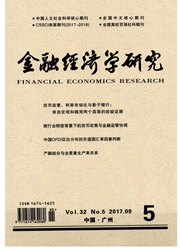

 中文摘要:
中文摘要:
金融是现代经济核心,影响经济增长速度,更影响经济增长方式和效率。全要素生产率(TFP)是衡量经济增长方式和发展效率的重要指标,因此如何通过金融手段来提高全要素生产率是目前研究经济转型升级和可持续发展的核心问题。根据广东省1985—2010年数据,首先测算广东省全要素生产率值,然后研究金融规模、金融效率、政府金融干预、金融增加值等金融发展指标与全要素生产率的关系。研究结果显示:全要素生产率并没有随GDP的增长而快速提高,反而表现出下滑趋势;金融规模、金融效率、政府金融干预与全要素生产率呈现显著正相关关系,而金融增加值与全要素生产率关系不显著;金融规模、政府金融干预与全要素生产率增长存在双向因果关系;金融效率是全要素生产率提高的单向格兰杰原因。
 英文摘要:
英文摘要:
Finance is the core of modern economy, which influences economic growth speed and plays a more important role in influencing the mode and the efficiency of econom-ic growth. Total factor productivity(TFP) is an important indicator of measuring the mode of economic growth and the efficiency of development. So how to improve the total factor pro-ductivity by the financial means is the core topic of the transformation and upgrading of the economy and sustainable development. Using the data of Guangdong province from 1985 to 2010, Firstly,we estimated the value of total factor productivity of Guangdong province, and then researched relationship between the total factor productivity and financial development indicators,such as the financial scale, financial efficiency, the government financial inter-vention, and the added value of finance. The results are as following: GDP growth didn' t lead to rapid increase of the total factor productivity, inversely, it had negative influence ; Fi-nancial scale, financial efficiency, and government financial intervention showed significant positive correlation with total factor productivity ,and the relationship between financial value and total factor productivity was not significant;Financial scale and the government financial intervention had the mutual causal relationship with total factor productivity growth ;Financial efficiency was the one-way granger reason of total factor productivitv improvement.
 同期刊论文项目
同期刊论文项目
 同项目期刊论文
同项目期刊论文
 期刊信息
期刊信息
